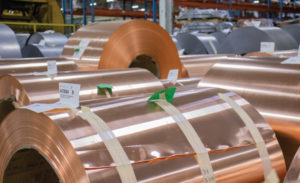The Ultimate Overview to Lasting Coping With Eco-Friendly Copper Products
The Ultimate Overview to Lasting Coping With Eco-Friendly Copper Products
Blog Article
Exactly How Copper Products Contribute to Sustainable Practices in Different Industries
Copper items are increasingly acknowledged for their substantial contributions to lasting methods across numerous markets, driven by their inherent properties such as performance, recyclability, and durability. In renewable resource systems, for example, copper enhances the functionality of solar and wind innovations, while its application in building minimizes waste with durability. The material's antimicrobial qualities use appealing benefits in healthcare settings. As industries look for to adopt even more sustainable practices, the function of copper could show critical in achieving ecological goals. What effects might this have for future innovations in sustainability?
Copper in Renewable Resource
Copper plays a crucial function in the advancement of renewable energy innovations, acting as a vital conductor in various applications. Its extraordinary electric conductivity and resistance to rust make it an excellent product for electric circuitry, which is necessary in solar panels, wind generators, and power storage systems. In solar photovoltaic systems, copper is made use of in the interconnections and circuitry, enabling reliable power conversion from sunlight to electrical energy.
In wind power, copper is indispensable to the generators and transformers that convert kinetic power into electrical power, making certain optimal efficiency and integrity. Additionally, the need for electrical vehicles (EVs) is boosting, with copper being a key element in batteries, electric motors, and billing facilities. The transition to EVs significantly improves the need for copper, as these automobiles generally make use of 4 times much more copper than traditional interior combustion engine lorries.
As the world seeks to mitigate environment adjustment and change to lasting power resources, copper's role comes to be progressively essential. The product not only enhances the efficiency and toughness of renewable resource systems however additionally sustains the broader objective of minimizing greenhouse gas emissions and advertising a sustainable future.
Eco-Friendly Building Materials
In recent times, there has actually been a notable shift towards the adoption of green building and construction materials in response to expanding environmental concerns. This modification is inspired by the requirement for lasting alternatives that decrease ecological impacts while maintaining structural stability and visual appeal.
Copper, understood for its longevity and recyclability, has emerged as a key player in this industry. It can be made use of in roof covering, plumbing, and electrical systems, adding to energy effectiveness and decreasing waste. Copper's longevity implies less substitutes with time, additional improving its sustainability profile.
In addition, products such as bamboo, reclaimed wood, and reused steel are gaining appeal. These choices not just supply decreased ecological influence but also advertise resource conservation. As constructing codes progressively highlight sustainability, builders and designers are integrating these materials into their jobs, promoting development in style.
The raising fostering of environmentally friendly building and construction products shows a broader commitment to sustainability in the constructed atmosphere. By prioritizing these materials, the building sector can significantly reduce its carbon impact, align with governing standards, and support a healthier ecological community for future generations. This pattern marks a crucial action in the direction of a more lasting future in construction.
Copper's Duty in Medical care
Current research studies have highlighted the substantial function of copper in health care setups, specifically as a result of its antimicrobial residential or commercial properties. Copper surfaces have actually been shown to decrease the presence of virus, including viruses and bacteria, by approximately 99.9% within a short period. This amazing effectiveness makes copper a vital material for high-touch surface areas in health centers, such as doorknobs, bed rails, and IV posts, therefore adding to improved infection control procedures.
Along with its click for info direct antimicrobial effects, copper additionally plays a role in the wider context of hospital sustainability (Copper Products). By including copper into medical tools and furnishings, healthcare centers can minimize the incidence of healthcare-associated infections (HAIs), which not only enhances person outcomes yet likewise lowers the costs associated with look at here extensive healthcare facility stays and added therapies
Moreover, copper's resilience and recyclability line up with sustainable methods, permitting accountable resource monitoring. As healthcare systems increasingly focus on both client safety and environmental stewardship, the assimilation of copper items is becoming extra widespread. This twin benefit highlights copper's vital contribution to a healthier, much safer, and more sustainable healthcare setting.
Sustainability in Transport

Additionally, copper's resilience and deterioration resistance add to the long life of transportation infrastructure (Copper Products). In rail systems, for example, copper components enhance the dependability and performance of signaling and power systems, crucial for lowering delays and energy usage. Additionally, copper's function in renewable energy systems, such as solar and wind, sustains sustainable transportation options by giving tidy power for electrical transit choices
Investments in copper modern technology not just foster sustainability but also stimulate financial development and job development in environment-friendly sectors. As industries strive to satisfy rigid ecological laws, the application of copper products in transportation becomes a crucial approach in achieving sustainability goals and promoting a cleaner, a lot more reliable future.
Copper and Round Economy
As the world progressively embraces sustainability, the role of copper in the round economic situation comes to be ever a lot more significant. Copper's innate buildings-- such as its conductivity, recyclability, and durability-- placement it as a crucial product in a resource-efficient economy. The round economic climate aims to minimize waste and optimize resource use with recycling and reusing materials, and copper master this regard.
The steel can be recycled forever without loss of high quality, making it a suitable candidate for lasting techniques across numerous markets, consisting of building, electronics, and renewable resource. By recovering and reprocessing copper from end-of-life products, industries can considerably reduce the demand for virgin materials, thereby decreasing environmental influences related to mining and handling.
In addition, the combination of copper right into circular economic situation structures not only preserves resources however likewise fosters innovation. Services that prioritize copper reusing contribute to a much more sustainable supply chain, improving their competition while lining up with regulative needs and consumer preferences for environmentally accountable items.
Conclusion
In verdict, copper products dramatically add to lasting techniques throughout multiple industries. Their important function in boosting renewable resource technologies, promoting eco-friendly building and construction materials, supporting infection control in healthcare, assisting in lasting transport, and embodying the principles of a circular economic climate highlights the adaptability and relevance of copper. By integrating copper right into various applications, industries can achieve higher effectiveness, lower ecological impact, and straighten with worldwide sustainability goals, ultimately fostering a more lasting future.

Copper's exceptional conductivity makes it a favored product in electric automobile (EV) systems, boosting energy performance and efficiency. In addition, copper's function in sustainable power systems, such as solar and wind, supports sustainable transport services by offering tidy energy for electrical transit choices.
Their important function in enhancing sustainable energy technologies, promoting environment-friendly building and construction materials, supporting infection control in health care, promoting lasting transportation, and symbolizing the concepts of a round economic climate underscores the versatility and importance of copper.
Report this page